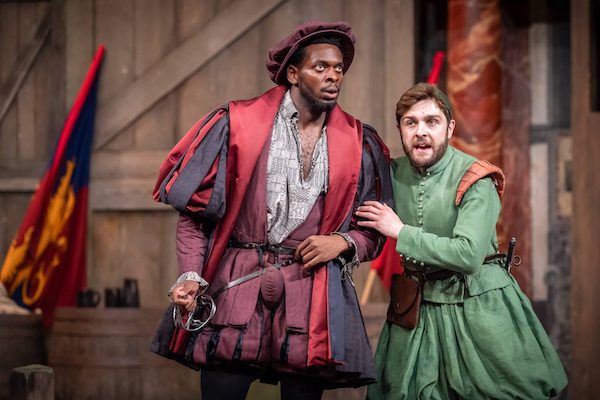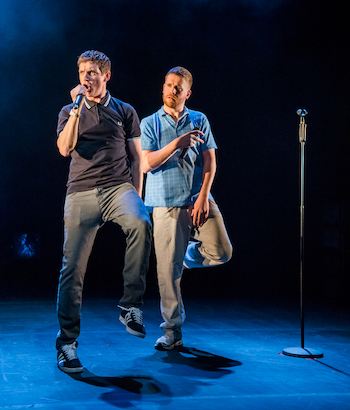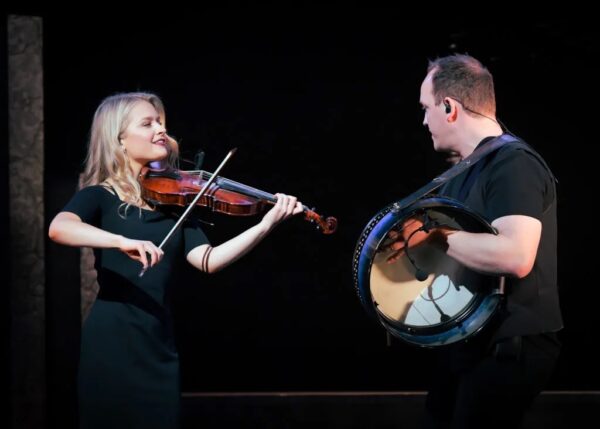Theater Reviews: Home Field Advantage — A Trio of European Stage Adventures
By David Greenham
Reviews of three shows seen during a trip to Ireland and England — Shakespeare at London’s Globe and “Dublin Oldschool” and “Riverdance” in Dublin.
The Comedy of Errors by William Shakespeare. Co-directed by Naeem Hayat and Sean Holms. Music direction by Hilary Belsey. Fight direction by Maisie Carter. Movement direction by Tasmin Hurtado Clarke. Designed by Paul Willis. Costume supervision by Jacquie Davies. Performed at Shakespeare’s Globe, London, through October 27.

The cast members of Shakespeare Globe’s staging of The Comedy of Errors. Photo: Marc Brenner
Let’s face it, Shakespeare’s Globe in London has a distinct home-field advantage. The replica of the famous “wooden O” (based on the original plans for the Rose Theatre, because there were no blueprints for the Globe Theatre) provides a delicious opportunity to step back in time.
In the case of The Comedy of Errors, that’s 430 years ago. The first record of a performance of the play is for the Feast of the Holy Innocents, part of the Christmas festivities on December 28, 1594, in the beautiful hall at Gray’s Inn about a mile and a half from the Globe.
You know the story. Identical twin brothers and their identical twin servants, born to “a mean woman” who was too poor to care for them, are separated in a storm. One pair ends up with their father, are rescued and returned to their home in Syracuse. The other pair disappear with their mother and are presumed captured or dead. Antipholus of Syracuse (Daniel Adeosun) is determined to find his lost brother, and he and his Dromio (Martin Quinn) sneak into the rival city of Ephesus to look for him. The law, we learn, is that any Syracusan caught in Ephesus will be killed. Antipholus and Dromio manage to assimilate, but not their father Egeon (Paul Rider), who is caught and brought before the Duke (Rhys Rusbatch). Before he’s dispatched, the Duke asks why Egeon would risk his life to come to Ephesus — the story then unfolds. Likely based on Plautus’s Menaechmi and the lesser known Amphitryon (though there are other suspected contributing sources), The Comedy of Errors is a zany romp filled with “fond fools” and “mad jealousy.” Many Shakespeare fans brush the farce aside, dismissing it as a lightweight draft for the more popular and poetic Twelfth Night.
The Globe production is a remounting of the enthusiastically received 2023 rendition. You can see why it has been revived: the staging is swift and silly, but it trusts the text to tell the story. Gone are the gimmicks and sight-gags some interpretations heavily rely on.
Egeon’s opening monologue provides the exposition and actor Paul Rider and the artistic team play it straight. The words and nothing but the words — it’s at once refreshing and heartbreaking. When an airplane flies over the theater, Rider casually gestures up to it as he describes watching his wife and one son and servant being “carried with more speed before the wind. And in our sight, they three were taken up by fishermen of Corinth, as we thought.”

Daniel Adeosun and Martin Quinn in Shakespeare Globe’s staging of The Comedy of Errors. Photo: Marc Brenner
The fun begins when the locals mistake the boys from Syracuse for their look-alike brothers, Antipholus of Ephesus (Caleb Roberts) and Dromio of Ephesus (Sam Swann). Both sets of twins deliver, but Martin’s cavalier lightness as Dromio of Syracuse shines above the rest. Antipholus of Ephesus’s wife Adriana (Gabrielle Brooks) and her sister Luciana (Shalisha James-Davis) easily surf the whirlpool of emotions and comic banter the roles require.
Infectious support comes from Christopher Logan’s wide-eyed and rubber-faced Angelo the jeweler, Phoebe Naughton’s sinewy merchant, and Rhys Rusbatch’s bizarre Pinch. Sassy Danielle Phillips stands out with her flaming red hair and in-your-face attitude as the second merchant and Luce.
Credit co-directors Hayat and Holmes for the swift pace — 100 minutes without an interval — aided and abetted by the clean precision of the staging. It’s refreshing to see an ensemble that works so well together, each seamlessly handing the focus to the other as the story demands, and clearly having a grand time doing so.
No, I didn’t take my place among the groundlings. I had been walking all day, so a bench with a cushion was the more comforting choice. But the theater was full, and the experience of watching a performance at the Globe was exactly as you’d expect: all of us — actors and audience — sharing an intimate laugh in “this wooden O” of a world.
Dublin Oldschool by Emmet Kirwan. Directed by Phillip McMahon. Produced by Verdant Productions. Performed at the Olympia Theatre, Dublin.

Emmet Kirwan (Jason) and Ian Lloyd Anderson (Daniel) in Dublin Oldschool at the Dorfman Theatre, London. Photo: Tristram Kenton
A decade ago, Dublin Oldschool exploded onto the stage at the Dublin Fringe Festival when Emmet Kirwan’s Jason declared “these be the days.” The production garnered the Best Fringe Performers Award, generated further acclaim at the Edinburgh Fringe, and was given a run at the National Theatre in London before being adapted into a 2018 feature film. As for Dubliners, they predictably either loved or hated it.
What luck, then, to be in Dublin for the two-night, 10th-anniversary performances of the original stage play starring the original and movie cast, Kirwan as Jason, and TV and film actor Ian Lloyd Anderson as his estranged brother, Daniel.
Raw and rough around the edges, Dublin Oldschool is an intense verbal waterfall that reflects the experience of a night on the town of wannabe DJ Jason. Rap and poetry intertwine, weaving a lyrical, and sometimes chaotic, look at Dublin’s dance music scene. Injected into that is an illuminating probe of an intimate family struggle.
Jason drinks and takes ketamine as he hunts for a good party while, at the same time, trying to avoid his ex-girlfriend, who’s already found someone new. He’s lost his latest job, has no money because he’s lost his wallet, and is on foot because his bike has been stolen. After the pubs close, he struggles to make his way through “the alcohol army” to his friend Lisa’s, who is having an after hours party.
It’s on his way to the shindig that he runs into Daniel, now a homeless drug addict. The brothers confess their way through anger, a sense of betrayal, and a recognition that just about everything in their lives has fallen apart. “The cheese fell off the cracker,” Daniel explains. He had it all, a college graduate with a good life in front of him. Now it turns out that it was Daniel who stole Jason’s bike to sell it for drugs. “I’m gettin’ better,” Daniel pleads. “Yeah, you’ve been gettin’ better for years, Daniel,” Jason snaps back.
Daniel smiles, “We can blame the parents,” he says. “All they did was give us a safe and comfortable home,” he laughs. “Yeah,” his brother adds with an imaginary shout to his parents, “fuck you with your love!” Even at their lowest point, the pair are poignantly aware of how they are trapped in self-loathing.
Dublin Oldschool captures a cultural moment that obviously struck a nerve. Contemporary “lost” generations aren’t following the established rules and those decisions are ending in disaster. Kirwan is both condemnatory and sympathetic to the lost brothers. The pair are complex characters: deep feelings and psychological gouges are mitigated by a desire for fun and a yearning to escape dead-end lives.
The production’s quick pace and Irish slang often left me on the outside looking in. The Dublin audience, on the other hand, cheered in recognition in many spots, like a congregation of like-minded souls who had had their dark nights of the soul. They commiserated rather than judged.
For me, Dublin Oldschool had a Brechtian alienation kick. The show made me think about our own lost generations of children in America. Most of the “traditional” ladders and opportunities, such as affordable college and housing, apprenticeships, and many other amenities that existed for my generation, have disappeared, the casualties of vulture capitalism and bottom-line thinking.
Kirwan would no doubt agree. In his program notes, the playwright comments, “Ireland as a society needs to have a proper discussion about addiction and homelessness.” Wouldn’t it be great if we could have a proper discussion about these and other issues on this side of the pond?

Brandon Asazawa and the Riverdance company. Photo: Jack Hartin, Abhann Productions
Riverdance by Bill Whelan. Directed by John McColgan. Scenic design by Alan Farquharson. Costume design by Joan Bergin. Lighting design by Andrew Voller. Sound design by Michael O’Gorman. High resolution projection design by Peter Canning. Performed at the Gaiety Theatre, Dublin. Coming to the PAC in Providence, RI, April 4-6, and the Wang Theatre, Boston, April 8-13, 2025.
Thirty years ago, in 1994, an unusual performance that unashamedly celebrated Irish Step Dancing was presented during an interval at the Eurovision Song Contest. That year’s contest winner “Rock ‘n’ Roll Kids” was from Ireland, but the tune is long forgotten. Five years later, the show Riverdance debuted and it became a world-wide sensation, eventually becoming a staple of PBS television fundraising campaigns across the country.
Now, in honor of the anniversary, a new tour has been mounted with the same music and general through-line, but featuring some remarkable projections and a talented cast of young dancers, singers, and musicians.
I hadn’t planned to take in the show, which was just about to end its hometown tryout, but the beautiful Gaiety Theatre was just around the corner from my hotel. And, as is almost always the case in the UK and other European locations, the tickets were affordable.
While the music and most of the dance is focused on Ireland (particularly step dancing) the theme of Riverdance — if there is one — is a semi-cosmic celebration of percussive movement. The mood of the show strives to reach up to the heavens: there’s dark, foggy lighting with projections of forests and hidden waterfalls or meandering streams combining with ethereal music and high-register crystal-clear female voices. But, with the first stop of the lead dancer’s steel-toed foot (in this case Ohio-born lead dancer Brandon Asazawa), Riverdance plants itself firmly on the ground. In addition to the Irish dancing, there are sections of the show featuring Flamenco (Madrid native Rocio Dusmet), a Dervish ensemble of four dancers from Moldova (Vlad Gasnas, Elena Macovei, Ana Turcan, and Eugeniu Turnan), and an amusing “American urban” tap dance battle with Dharmesh Patel and Cipher Goings going up against a couple of Irish step dancers.

Fiddler Haley Richardson and percussionist Mark Alfred in Riverdance. Photo: Jack Hartin, Abhann Productions
The instrumental quartet — Emma McPhilemy on saxophone, Cathel Croke on the uilleann pipes, Haley Richardson on fiddle, and Mark Alfred on drums — play an integral part of the action. Drummer Alfred and fiddler Richardson bring their personalities to the stage with vigor.
The lighting, sound, and costumes are what you’ve come to expect from Riverdance All are executed perfectly. Many theater lovers have a love/hate relationship with projections, but, like them or not, they’re here to stay, and the 3D high-concept projections for this anniversary production of Riverdance are fascinating to look at — beautifully executed and incorporated into the routines. For better or for worse, they’re almost a show of their own.
Still, it’s the 26 step dancers who provide the distinctly exhilarating impact of Riverdance, and this revival, even on the Gaiety’s small stage, high steps in style. Riverdance is pure entertainment, of course, but if you’ve only seen it on television, grab a ticket when it comes to New England. It’s much more invigorating up close and personal.
David Greenham is an arts and culture consultant, adjunct lecturer on Drama at the University of Maine at Augusta, and is the former executive director of the Maine Arts Commission. He can be found at https://davidgreenham.com/
Tagged: "Dublin Oldschool", "Riverdance", Brandon Asazawa, Naeem Hayat, Sean Holms., The Comedy of Errors
